NI election 2022: Polling stations close to voters
- Published

Polls closed at 22.00 BST, a total of 239 candidates were running in 18 constituencies across Northern Ireland
Voting in the Northern Ireland Assembly elections has now ended with polling stations closing their doors at 22:00 BST.
A total of 239 candidates are running in 18 constituencies across Northern Ireland, including a record 87 women.
The Electoral Office said the indicative turnout was 54% as of 21:00.
However, the official final turnout figure will not be known until Friday. At the last assembly election in 2017, the overall turnout was 64%.
Chief electoral officer Virginia McVey explained earlier in the day that this was the first time turnout could be monitored digitally.
The Electoral Office said the figure was based on the average of returns from polling stations, with the indicative turnout ranging from 60% in West Belfast to 47% in the South Antrim constituency.
Voters were able to use the single transferable vote (STV) form of proportional representation.
This allowed voters to rank as many candidates as they wanted in order of preference.
Counting begins on Friday with five candidates to be elected in each constituency.
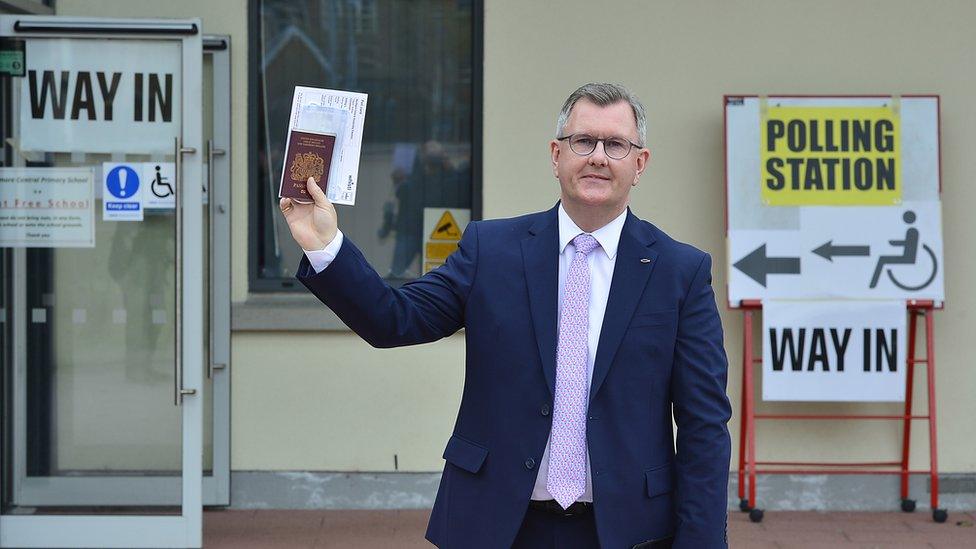
DUP leader Sir Jeffrey Donaldson casts his vote on Thursday morning
The election will not only decide who is elected to the assembly, but also who is entitled to hold the posts of first minister and deputy first minister.
The biggest party after the election will be entitled to the role of first minister while the biggest party from the second biggest of the unionist and nationalist blocs will be entitled to the role of deputy first minister.
But because the roles are a joint office and one cannot exist without other, both of these parties would have to agree to work together for Northern Ireland's devolved executive to return.
Speaking after the polls closed, former DUP MP and MLA Emma Little-Pengelly said the initial turnout figures were "to be expected".
"They don't look dramatically, enthusiastically high. They don't look disappointingly low," she told BBC One's The View programme.
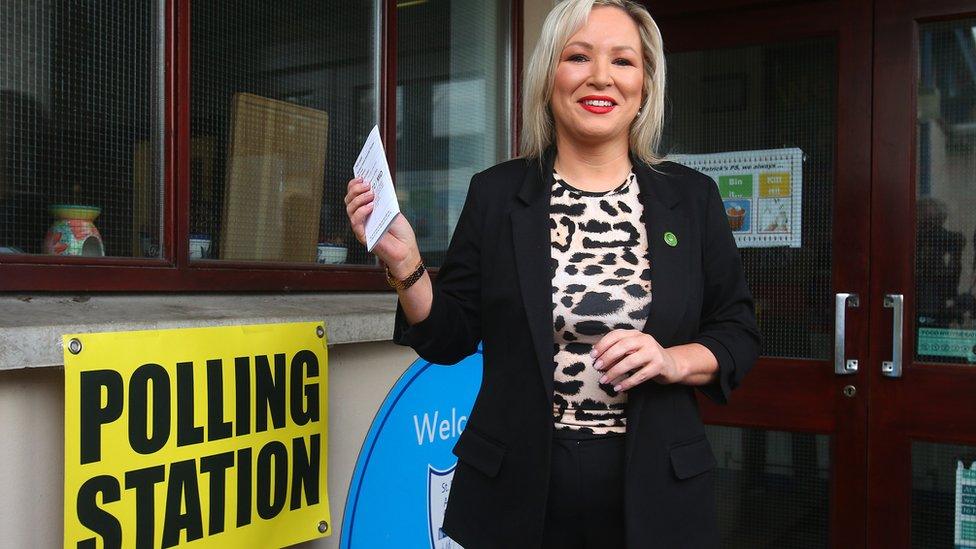
Sinn Féin deputy leader Michelle O'Neill casts her vote in County Tyrone
"It was a low-energy campaign; it wasn't the most exciting of campaigns. People haven't come out in huge numbers."
Sinn Féin MP John Finucane said the voting register was very different this year, with a marked increase in voters in every constituency.
"My own experience of Belfast today is of polling stations where people were waiting over an hour to vote."
He said the indicative turnout was "not taking into account a surge from 9pm onwards or postal voting".

SIGN UP FOR ALERTS: Get extra updates on BBC Northern Ireland election coverage

Danny Kennedy, UUP chairman, said the turnout was likely to be around 60% "which was not bad considering it was a fairly low-key election campaign".
"There was a general mood that some people were determined to teach the DUP a lesson," he told the programme.
"Whether or not that will be reflected in results and trends that we will see tomorrow... I think the TUV will have an increase in support and it'll be interesting to see if that will translate into seats."
Tom Kelly, former SDLP adviser, said: "You have to be disappointed as a political party, where all of these parties have been campaigning, we are a highly politicised society and nearly 40% of the public don't vote .
"I think that is quite damming on the political system, that is a judgement on how Stormont has been run and people have decided to opt out."
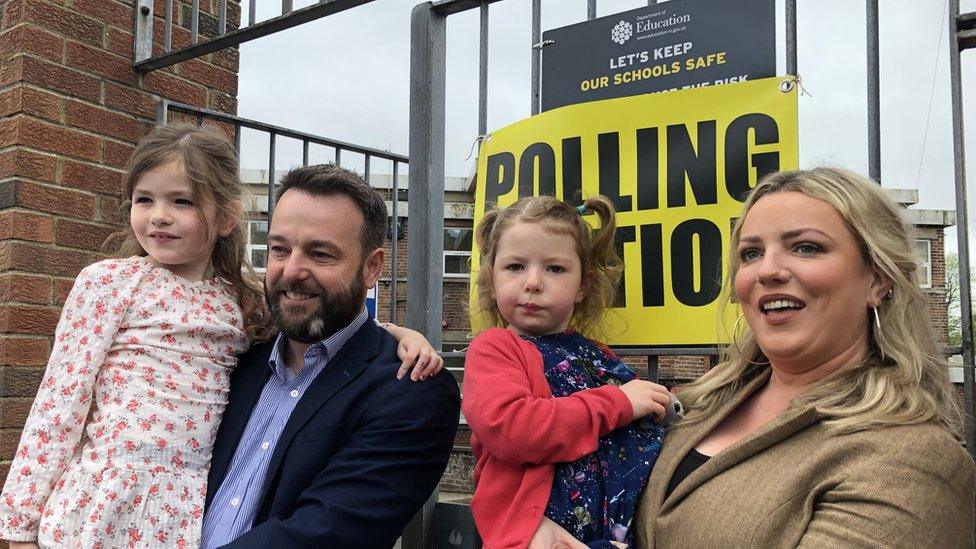
SDLP leader Colum Eastwood and family at the polling station in Londonderry
Chris Lyttle, a former Alliance MLA, said the Alliance campaign had been "positive".
"We speak about a low turnout but in some in some of the polling stations in my own constituency of East Belfast we are seeing turn out figures as high as 70%," he said.
"That to me indicates that there are people in Northern Ireland who do want to see different parties given the opportunity to deliver better government."
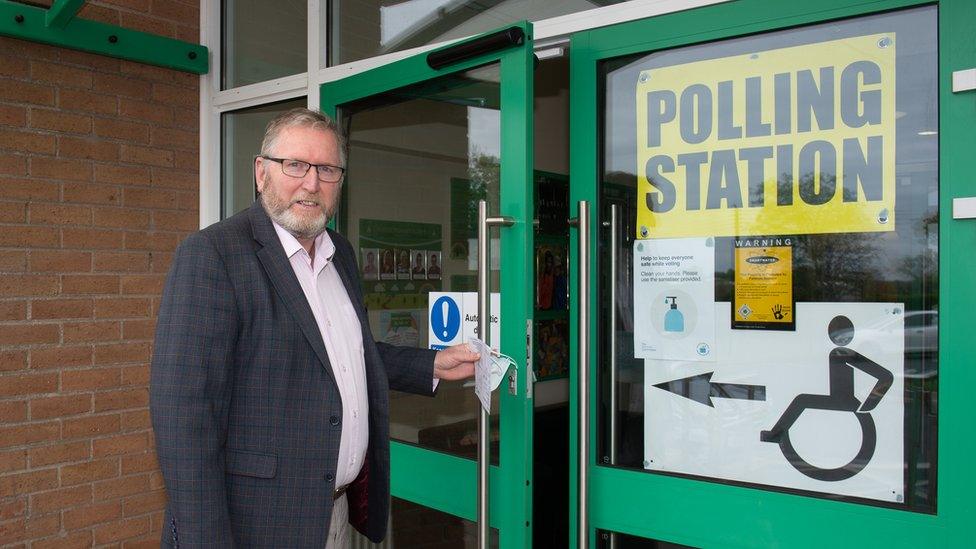
UUP leader Doug Beattie casts his vote earlier on Thursday
Sinn Féin fielded the most candidates with 34, followed by the Democratic Unionist Party (DUP), who were standing 30.
The Ulster Unionist Party (UUP) had 27, while Alliance had 24 and the SDLP had 22.
The Traditional Unionist Voice (TUV) fielded 19 candidates, the Green Party had 18 and People Before Profit 12.
One of the Green Party candidates, Stefan Taylor in Mid Ulster, was suspended from the party but his name still appeared on the ballot paper as a Green candidate.
Aontú also fielded 12 candidates, the Workers Party had six candidates in the race and the Progressive Unionist Party (PUP) three.
The Irish Republican Socialist Party (IRSP) and the Socialist Party had two candidates each.
The Northern Ireland Conservatives, Cross Community Labour Alternative (CCLA), Resume NI and Heritage Party were all fielding one candidate each.
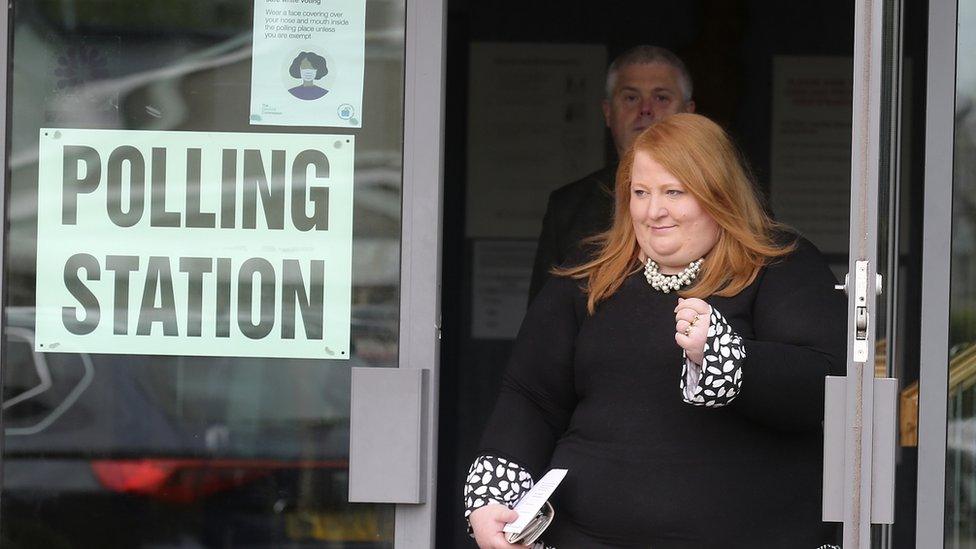
Alliance leader Naomi Long casts her vote in Belfast
There were also 24 independent candidates in the field.
Of all 18 constituencies in Northern Ireland, Belfast West had the largest number of candidates standing, with 17 going on the ballot paper.
East Antrim had the fewest with 10 candidates standing in the constituency.
When will we know the results?
Verification of ballots begins at 08:00 on Friday and counting will start after that.
We could know the first results from lunchtime and counting will continue throughout Friday and possible into Saturday.
There will be full coverage on the BBC News NI website throughout the day and on BBC One Northern Ireland and BBC Radio Ulster from 12.15.

POSTCODE SEARCH: What are the results in my area?
NOTIFICATIONS: Sign up for Northern Ireland election alerts

Related topics
- Published12 April 2022
